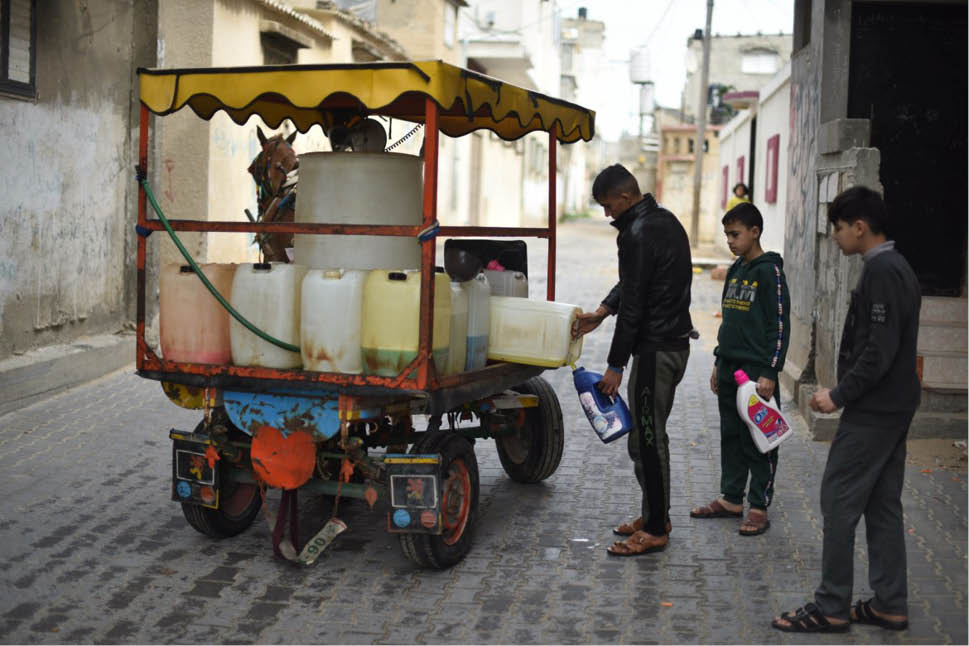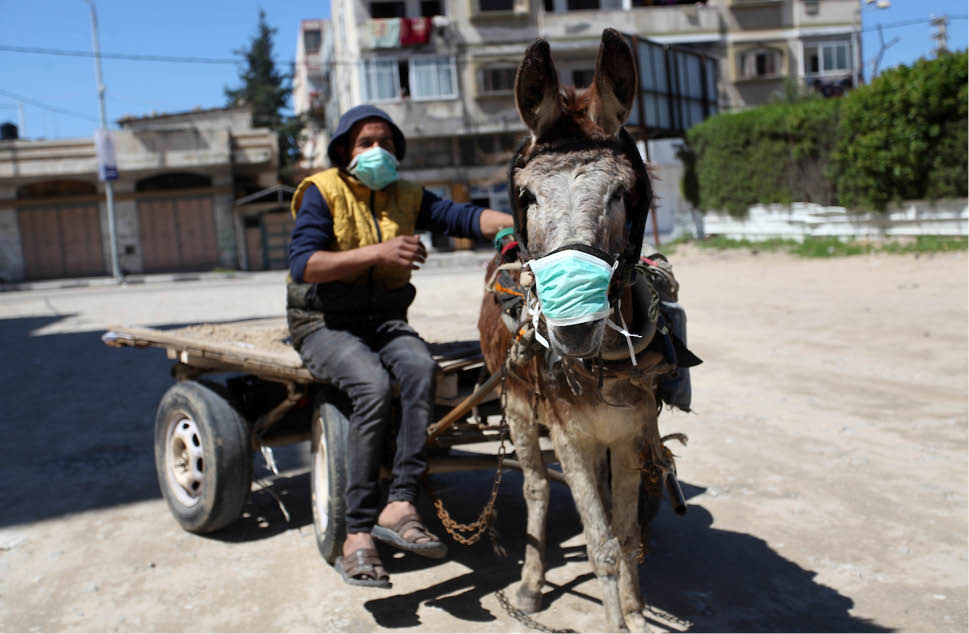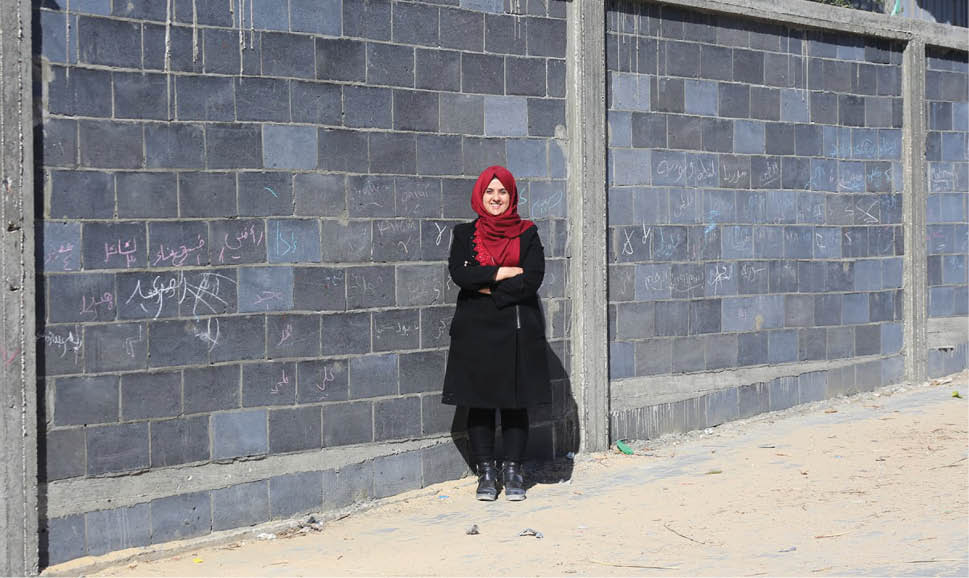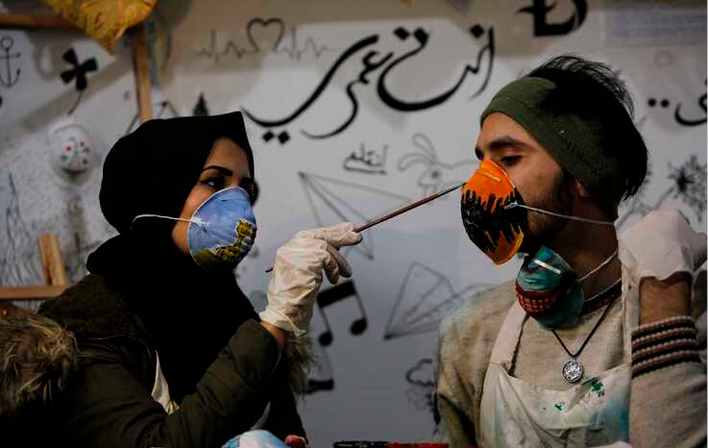On March 5, 2020, Palestinian Prime Minister Mohammed Shtayyeh declared a state of emergency, canceling the reservations of all foreign tourists and shutting down all educational institutions after COVID-19 had been discovered and traced to a hotel in the West Bank. The Palestinian Ministry of Health believes that the virus was brought to Palestine by Greek tourists who later tested positive for the virus. By mid-March, Gaza also began to take precautions. It closed the Erez crossing to Israel where the virus was spreading and isolated in temporary housing Palestinians who had come to Gaza from Israel. Kindergartens, schools, and universities, as well as cafés, restaurants, and nonessential businesses were closed. Gatherings of more than 100 people were banned, which meant that wedding halls were closed as well. On March 22, the first two cases of contagion with the coronavirus were reported in Gaza. The patients were taken to a hospital in Rafah prepared by the authorities for the treatment of virus patients.*1
As of April 20, 15 cases have been reported in Gaza, all of which are said to have come from the outside. While emergency measures remain in place, some aspects of life in Gaza have continued, due in large part to their necessity in order to ensure the survival of the population. Efforts to determine the accurate number of infected persons, and indeed deaths caused by the novel coronavirus, face many problems in Palestine. Similar to other places in the world, the lack of testing capacities is exacerbated by conflict. So far, however, only 480 confirmed cases and four deaths have been reported in the Palestinian territories, whereas Israel has reported over 14,882 cases and 193 deaths at the time this article was written.*2 One may deduce that the number of cases in Palestine will invariably go up, or is already much higher.

As infections are spreading in countries throughout the region, we must consider conditions in Gaza before the pandemic because they will determine its future fate both in combatting the virus and in dealing with the aftermath. The pandemic’s repercussions are likely to result in the socio-economic collapse of the Strip and increase the potential for conflict.*3 The UN special rapporteur for the situation of human rights in Palestine has stated that in Gaza, the healthcare system “was collapsing even before the pandemic… Its stocks of essential drugs are chronically low.”*4
Per thousand people, Gaza has 1.3 hospital beds and 50 to 60 ventilators.*5 Electricity is lacking for much of the day, which means that lifesaving machines cannot be depended upon.*6 Moreover, 80 percent of the people in Gaza are dependent on international aid, and 95 percent do not have access to clean water. General unemployment is over 50 percent, while unemployment among youth amounts to over 70 percent. As one of the most densely populated parts of the world, places such as Jabaliya Refugee Camp house around 82,000 people per square kilometer.*7 The political system is fragile, as it must deal with fragmented governments, the division between Hamas and Fatah, and the occupation.
It is not possible at this stage to acquire the data necessary to comprehend the long-term economic toll that the virus will have on Gaza. Yet, it is without doubt that even in the early stages of the pandemic’s grip on fragile Gaza, an economic downturn has already become a reality.*8 A local report published in early April stated that Gaza’s economy lost over US$200 million in March alone.*9 Trading Economics forecasted a 2-percent drop in the GDP in the first quarter.

Gaza’s National Committee for Breaking the Siege published a report on April 12 in which Jamal al-Khudari, the head of the organization, stated: “The Israeli occupation, siege and measures against COVID-19 have resulted in an economic crisis, and if it continues, it will create an unprecedented disaster … for workers, factories and the trade, agriculture and tourism sectors.”*10 Between March 22 and 30, a survey of 305 parents revealed that 94 percent reported a deterioration of their economic situation due to the coronavirus, causing food insecurity.
“Gaza will not be livable by 2020.” United Nations
In some cases, however, employment opportunities have arisen from the virus outbreak. Since mid-March, the Unipal garment factory that due to the effects of the blockade had not operated at full capacity for over a decade, has hired 400 workers to produce medical-grade protection gear. While one might assume that short-term employment caused by the virus may help such companies stay afloat, the story is not so simple. The factory’s owner, Bashir al-Bawab told Al-Jazeera news that while the company had supplied pharmacies and private healthcare facilities in Gaza, most of the orders have come from the West Bank and Israel.*11 Al-Bawab also expressed concern because, as the factory receives its supplies from Israel, he was unsure whether essential fabrics and materials would continue to be sent to Gaza during a time of global shortage.
“The people of Gaza are resourceful and innovative, with garment factories shifting production to make masks and surgical gowns. However, their ingenuity can do only so much, particularly under siege and occupation.”
The Washington Post*12
It’s easy to forget that social distancing is a privilege of the developed world, not a choice of the developing world where welfare and basic standards of living simply do not exist. People living in places such as New Delhi, Latin American slums, or Gaza may have to ignore movement restrictions to survive. Before the virus outbreak, 80 percent of Gaza’s population depended on international aid, living below the poverty line and with limited access to food and water.*13 In other words, while it may be catastrophic for people within the context of an already crippled economy to ignore social distancing measures, abiding by them could be equally dire. In recent weeks, many Gazans have spoken about their need to ignore social distancing protocols and find work so that their children would not starve. Workers in various industries, from construction to agriculture, were crippled within days by the devastating economic toll unleashed upon them by the restrictions. Their basic, underlying condition is a result of Israel’s siege on Gaza that has long devastated the economy, leaving the government unable to provide basic support to its people. Seventy-five percent of families were failing to provide enough food for basic needs, even before the coronavirus crisis.*14
Fruit and vegetable vendors are among those who have few choices. Agricultural production in Gaza is seasonal, and products – such as the strawberries currently in season – must be sold while customers are increasingly cash-strapped. Few vendors can afford to buy masks and gloves. The Hamas-led government of Gaza has banned agricultural exports entirely and distributed US$1 million in vouchers for animal feed among farmers. The PA’s Ministry of Agriculture has promised to extend support to vegetable farmers hit by a sudden drop in both demand and prices. The price of, for example, 1 kilogram of onions has dropped from 55 cents to half this amount.*15
In Gaza, carts selling sanitation products always had a place for those who could afford them. In recent weeks, demand has risen both for personal use and among volunteers disinfecting streets and cars. Still, 82 percent of families have expressed their need for hygiene kits amid coronavirus.*16 The demand for cleaning supplies has risen while perfumes as well as makeup and skin care products show a decrease in sales among a general downturn in trade. “People are very cautious about going out, even to buy important things. Almost 50 percent of shops have been closed because of weak movement. All shops, cafés, and restaurants have been affected by the coronavirus, some have closed, and employees have become unemployed,” I was told by Ayman Shaikh who works in his father’s cosmetics company. A fashion designer who asked to remain anonymous said that demand has dropped significantly for him, and he has experienced 60–70 percent losses in recent weeks.
A new and growing development is taking place in Gaza even though there is no evidence that the spread of the novel coronavirus is slowing down or will be contained soon: there are indications that people refuse to abide by the lockdown and are attempting to return to what is considered “normal” in Gaza. Ayman believes that things are slowly improving already: “Sales so far are not comparable to the period before corona, but we can’t deny there is slow improvement.”
Majd Mashhawari is a 25-year-old CEO and entrepreneur who creates bricks from recyclable materials amidst destruction caused by Israeli assaults and builds SunBox, a successful solar kit that generates electricity for Gazans.*17 She told me on a live call on April 18 that she shut down operations at SunBox for two and a half weeks “when the situation worsened” but went back to work “when there were some reports of recovery.” She explained that businesses feel responsible for their employees and under pressure to get back to work: “If we shut down for a couple of months, like the rest of the world, [nine] families won’t have any income.” A local taxi driver who also wished to remain anonymous already lost his livelihood because he could not afford to pay the rent for his car. He explained that there was “no support available” and now depends on help from relatives and the UN.
Majd says that social solidarity binds Gazans together during these times. “When the quarantine started, my phone did not stop ringing with friends saying, ‘Let’s gather food, let’s gather money and give it to the people who don’t have an income or whose income was just shut down because of the situation.’” While resources are limited, Majd commented that efforts are being made by the Palestinian government to offer support. But she also acknowledged that it was not enough: “I believe that if the coronavirus hit Gaza for a couple months, people would eat each other… We already have a collapsed economy… For us to function as a company is really hard during regular times. Imagine what the situation would be like if we did not even have a market and could not sell anything. The whole country would collapse.”

The outbreak of COVID-19 has revealed many truths and exposed what was not working in the ways we were living. It is to be hoped that for conflict-ridden places, it will bring much-needed attention to crises the world has turned its back on. The collective economic and human story of Gaza tells of immeasurable daily suffering. People struggle to gain access to water and food and to the means necessary to provide for their families. They lack basic sanitization, have only limited access to higher education, are denied human rights, and more. And this, not the novel coronavirus, is the real tragedy. As the light has temporarily been shone on Gaza again, it is clear that the siege must be lifted. A siege that for fourteen years has made Gaza truly “unlivable,” even though there are two million people who have no other choice but to live there. So far, the outbreak of COVID-19 has been contained and is minimal in Gaza. But the economic and human consequences have been extreme due to the siege and pre-existing reality. This reality must change so that Gazans may not only have a chance to fight future pandemics, if not this one, but to live, breathe, and strive as well. This and only this will lift the collective stain on our shared humanity that has allowed the rights and prospects of Gazans to become so bleak.

Sir Vincent Fean, the former British consul general to Jerusalem who is now a chair of the Balfour Project charity and a board member of the Palestine Britain Business Council, when asked to comment on the level of aid Gaza can expect under the current circumstances asserted that the most important action must be taken by Israel. He urges that the legitimate movement of people and goods between Gaza and the West Bank be facilitated, and indeed between Gaza and Israel itself. “The business community in Gaza is very resourceful and flexible, and can do much, but it needs the freedom to trade. You can call that lifting the blockade, or applying correctly the Geneva Convention. For, make no mistake, Israel continues to occupy Gaza militarily… Nothing would do more for the economy of Gaza than that single step. It can be done – but only if the political will is there. Israeli policy is crucial. Israel has the power to do much good or prolong harm.” In terms of international support, Sir Vincent states that while the world is tackling SARS-CoV-2 and pressured domestically to “help its own people get back on their feet after the lockdown,” attention should not be diverted from helping Gaza. “Government funds for international development must not be diverted from that purpose. The need will be greater than ever.” The efforts of UNRWA, the European Union, and “trustworthy” NGOs (Medical Aid for Palestinians, IMET 2000) and the British and US governments are vital.
*1 Jewish Voice for Peace Health Advisory Council, “The politics of coronavirus: A timeline of public health actions in Israel/Palestine,” March 30, 2020, available at https://mondoweiss.net/2020/03/the-politics-of-coronavirus-a-timeline-of-public-health-actions-in-israel-palestine/.
*2 Coronavirus, State of Palestine,” Worldometer, available at https://www.worldometers.info/coronavirus/country/state-of-palestine/.
*3 Hugh Lovatt,,“Defeating Covid-19 in Gaza: is it enough?” European Council on Foreign Relations, April 7, 2020, available at https://www.ecfr.eu/article/commentary_defeating_covid_19_in_gaza_is_it_enough1.
*4 “COVID-19: Israel has ‘legal duty’ to ensure that Palestinians in OPT receive essential health services – UN expert,” UN Human Rights, Office of the High Commissioner, available at https://www.ohchr.org/EN/NewsEvents/Pages/DisplayNews.aspx?NewsID=25728&LangID=E.
*5 Jewish Voice for Peace Health Advisory Council, “The politics of coronavirus.”
*6 Tarek Loubani, “Gaza is an open-air prison. As covid-19 spreads, it’s time to lift the siege,” The Washington Post, April 5, 2020, available at https://www.washingtonpost.com/opinions/2020/04/15/gaza-is-an-open-air-prison-covid-19-spreads-its-time-lift-siege/.
*7 “What life is like under the continuing Israeli blockade,” The Conversation, November 7, 2019, available at https://theconversation.com/gaza-what-life-is-like-under-the-continuing-israeli-blockade-124528.
*8 Hugh Lovatt, “Defeating Covid-19 in Gaza.”
*9 “Coronavirus costs Gaza economy 200 mln USD in losses during March: report”, Xinhua Net, April 3, 2020, available http://www.xinhuanet.com/english/2020-04/03/c_138945136.htm.
*10 Gulsen Topcu, “Palestine’s Economy hit by COVID-19, Israeli occupation,” Anadolu Agency, April 13, 2020, available at https://www.aa.com.tr/en/latest-on-coronavirus-outbreak/palestines-economy-hit-by-covid-19-israeli-occupation/1802362#.
*11 Fedaa al-Qedra, “Garment factory shifts production to masks,” Al-Jazeera, April 5, 2020, available at https://www.aljazeera.com/news/2020/04/gaza-garment-factory-shifts-production-masks-coronavirus-200404204638075.html.
*12 Tareq Loubani, “Gaza is an open-air prison.”
*13 Gaza Strip, UNRWA, available at https://www.unrwa.org/where-we-work/gaza-strip.
*14 Atfaluna Society for Deaf Children, “Factsheet on Impact of COVID 19 Outbreak on the Socioeconomic Conditions of Families in the Gaza Strip, 2020,” April 14, 2020, available at http://pngoportal.org/en/2756.html.
*15 Harry Fawcett, “Covid-19 crisis fuels Gaza farmers’ economic woes,” Al Jazeera News, 19/04/20, available at https://www.aljazeera.com/news/2020/04/covid-19-crisis-fuels-gaza-farmers-economic-woes-200419093633139.html.
*16 Atfaluna Society, “Factsheet.”
*17 Saeed Kamali Dehghan, “The Palestinian entrepreneur bringing power to Gaza”, The Guardian, 27/09/20, available at https://www.theguardian.com/global-development/2019/sep/27/the-palestinian-entrepreneur-bringing-power-to-gaza-majd-mashharawi.


